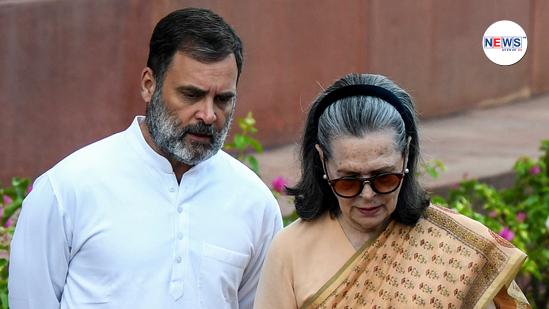
National Herald case: What does ED chargesheet say against Sonia Gandhi and Rahul Gandhi?
The Enforcement Directorate has filed a chargesheet against Congress leaders Sonia Gandhi, Rahul Gandhi and others in connection with alleged money laundering in the National Herald case.
Special judge Vishal Gogne took up the chargesheet, filed on April 9, for cognisance and listed the matter for further hearing on April 25.
The probe agency has named former Congress president Sonia Gandhi as accused number 1 and her son, Leader of Opposition in the Lok Sabha Rahul Gandhi, as accused number 2 in its prosecution complaint.
The charges were filed under various sections of the Prevention of Money Laundering Act (PMLA) before the court of special judge Vishal Gogne.
The chargesheet also names Congress associates Suman Dubey and Sam Pitroda, the companies Young Indian and Dotex Merchandise Private Limited, and Sunil Bhandari of Dotex Merchandise as accused.
The ED has invoked sections 44 and 45 of the Prevention of Money Laundering Act (PMLA) for committing the offence of money laundering under Section 3 of the Act, along with Section 70, which deals with offences by companies, to establish the vicarious liability of the firms’ office bearers and executives.
The agency has sought punishment for the accused under Section 4 of the PMLA, which provides for a jail term of up to seven years.
Charges against Sonia Gandhi and Rahul Gandhi
The Enforcement Directorate (ED), citing a 2017 Income Tax assessment order, has alleged in its chargesheet that key office-bearers of the All India Congress Committee (AICC), along with the principal officers of Associated Journals Limited (AJL) and Young Indian, orchestrated a “criminal conspiracy” to take over properties worth ₹2,000 crore belonging to AJL, an unlisted public company.
The ED has mentioned that 99 per cent of AJL’s shares were transferred to Young Indian—a private firm—for just ₹50 lakh. Sonia Gandhi and Rahul Gandhi each hold a 38 per cent stake in Young Indian, while the remaining 24 per cent was jointly held by the late Motilal Vora and Oscar Fernandes, who the ED describes as “close associates” of the Gandhis.
The chargesheet further alleges that the accused conspired to convert an outstanding loan of ₹90.21 crore, earlier extended by AICC to AJL, into equity shares worth ₹9.02 crore, which were then transferred to Young Indian for a nominal sum.
This move, the ED claims, effectively gave Sonia Gandhi and Rahul Gandhi “beneficial ownership” of AJL’s vast real estate assets.
Although Young Indian was registered under Section 25 of the Companies Act as a not-for-profit entity—a defence Congress has consistently highlighted—the ED has maintained that the company did not engage in any charitable activities. Sources said the agency found no expenses related to such activities during Young Indian’s existence.
The chargesheet also refers to the 2017 Income Tax assessment order to support its claim that Young Indian evaded over ₹414 crore in taxes by “illegally acquiring” AJL’s assets.
The ED launched its investigation in 2021 following a complaint by BJP leader Subramanian Swamy, which was taken cognisance of by a Delhi court in June 2014.





